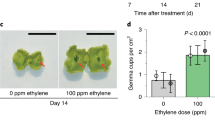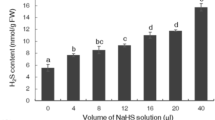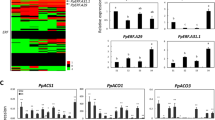Abstract
Ethylene is produced by plants at specific stages of their life cycle and is involved in the regulation of many developmental processes, such as fruit ripening, flower fading, leaf abscission, growth in aquatic plants and initiation of flowering in bromeliads1,2. Ethylene is also formed when plants are subjected to stress by, for example, wounding, noxious chemicals, drought or waterlogging1–3. In both cases the biosynthetic pathway begins with methionine 1–5. It proceeds to ethylene by way of S-adenosylmethionine (SAM) and 1-aminocyclopropane-1-carboxylic acid (ACC), a recently discovered intermediate6,7, in ripening fruit7,8 and auxin-treated pea stem sections9,10. We now report that wound-induced ethylene synthesis also proceeds by way of ACC and that it is regulated at the level of the ACC-forming enzyme (ACC synthase). Wounding of pericarp tissue of tomato fruit (Lycopersicon esculentum Mill.) results in rapid enhancement of the activity of ACC synthase and, consequently, in a greatly increased rate of ACC synthesis.
This is a preview of subscription content, access via your institution
Access options
Subscribe to this journal
Receive 51 print issues and online access
$199.00 per year
only $3.90 per issue
Buy this article
- Purchase on Springer Link
- Instant access to full article PDF
Prices may be subject to local taxes which are calculated during checkout
Similar content being viewed by others
References
Abeles, F. B. Ethylene in Plant Biology (Academic, New York, 1973).
Lieberman, M. A. Rev. Pl. Physiol. 30, 533–591 (1979).
Yang, S. F. & Pratt, H. K. in Biochemistry of Wounded Plant Tissues (ed. Kahl, G.) 595–622 (Walter de Gruyter, Berlin, 1978).
Hanson, A. D. & Kende, H. Pl. Physiol. 57, 538–541 (1976).
Hyodo, H. Pl. Physiol. 59, 111–113 (1977).
Lürssen, K., Naumann, K. & Schröder, R. Z. Pflanzenphysiol. 92, 285–294 (1979).
Adams, D. O. & Yang, S. F. Proc. natn. Acad. Sci. U.S.A. 76, 170–174 (1979).
Boller, T., Herner, R. C. & Kende, H. Planta 145, 293–303 (1979).
Jones, J. F. & Kende, H. Planta 146, 649–656 (1979).
Konze, J. R. & Kende, H. Planta 146, 293–301 (1979).
Meigh, D. F., Norris, K. H., Craft, C. C. & Lieberman, M. Nature 186, 902–903 (1960).
Lee, T. H., McGlasson, W. B. & Edwards, R. A. Radiat. Bot. 10, 521–529 (1970).
Herner, R. C. & Sink, K. C. Jr Pl. Physiol. 52, 38–42 (1973).
Saltveit, M. E. Jr & Dilley, D. R. Pl. Physiol. 64, 417–420 (1979).
Kende, H. & Hanson, A. D. Pl. Physiol. 57, 523–527 (1976).
Lizada, C. & Yang, S. F. Analyt. Biochem. 100, 140–145 (1979).
Author information
Authors and Affiliations
Rights and permissions
About this article
Cite this article
Boller, T., Kende, H. Regulation of wound ethylene synthesis in plants. Nature 286, 259–260 (1980). https://doi.org/10.1038/286259a0
Received:
Accepted:
Issue Date:
DOI: https://doi.org/10.1038/286259a0
This article is cited by
-
An artificial metalloenzyme biosensor can detect ethylene gas in fruits and Arabidopsis leaves
Nature Communications (2019)
-
Physicochemical, physiological and anatomical properties of three segments of peach palm for industrial use and minimal processing
Journal of Food Measurement and Characterization (2019)
-
Oligogalacturonic acids promote tomato fruit ripening through the regulation of 1-aminocyclopropane-1-carboxylic acid synthesis at the transcriptional and post-translational levels
BMC Plant Biology (2016)
-
Increase in ACC oxidase levels and activities during paradormancy release of leafy spurge (Euphorbia esula) buds
Planta (2013)
-
Involvement of two rice ETHYLENE INSENSITIVE3-LIKE genes in wound signaling
Molecular Genetics and Genomics (2009)
Comments
By submitting a comment you agree to abide by our Terms and Community Guidelines. If you find something abusive or that does not comply with our terms or guidelines please flag it as inappropriate.



